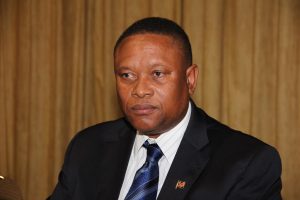
By: Megameno Shinana
Former fisheries and marine resources minister and Fishrot corruption accused, Bernard Esau vehemently denied in court that he was a lone wolf who operated with a syndicate to benefit from Namibia’s fisheries sector.
Esau on Tuesday continued to provide his evidence in the Windhoek Magistrate’s Court before acting judge David Munsu.
He is being represented by prominent lawyer Richard Metcalfe of Metcalfe Beukes and Attorneys.
At the centre of his submissions were the amendments of the Marine Resources Act, which amendments have been said to have been affected to allow the ex-minister and his coterie of accomplices access into the lucrative sector.
Reports are that Esau allegedly conspired with former justice minister Sacky Shangala to make the amendments in 2015 to create a legal loophole to be able to pull off massive corruption now known as Fishrot
The amendment of Section 3 of the Marine Resources Act accorded any sitting fisheries minister unfettered control over fishing quotas, and fisheries agreements and a discretion to waiver certain sections of the Marine Resources Act 2000 if and when necessary.
But Esau said there was nothing amiss about the legislation as has been reported so far.
He said the amendments were extensively interrogated by a committee chaired by the justice minister, were smoothly sailed through in both houses of parliament and that they were never commented on by the opposition.
He also said there was no public display of protest by way of demonstrations when the amendments were introduced and that he also consulted with then president Hifikepunye Pohamba.
“Even the opposition never commented, they supported those amendments. It went to the second house (National Council) and it went through. Nobody, not even members of parliament from both houses were anti-amendments,” he said.
Esau, who last week came after cabinet ministers whom he said bagged millions of dollars from S&T (Out of town allowance), also pressed on to say that there was a good intention behind the amendments to the controversial legislation.
He also went on to dismiss before court that the much talked about relationship with his son-in-law, Tamson Hatuikulipi was inclined towards racking in money in a dubious way from the sector.
“I want to testify that there was no conspiracy between me and those who are alleged to have conspired with me. There was no intent, knowingly or otherwise, to benefit myself or any other person except the state and also to benefit for sure the national fishing corporation of Namibia. (There was) zero (financial reward), my lord.”
“I never benefited a single cent or an iota of a penny. My relationship with Tamson cannot be interpreted (to mean) that I have benefited through association, through amending the law or to benefit any other co-accused. That was not the case,” he said.
Lawyer, Metcalfe, also submitted that the sailing of the Marine Resources Act through cabinet, the national council and the national assembly can only mean that “it would have been an almighty conspiracy,” for Esau to pull off, and given that there was input from the fishing industry as well.
A STALINGRAD DEFENCE OF LEGISLATION
Esau provided what came out to be a Stalingrad defence of the controversial act, and hammered that he used it to bring unprecedented benefits to ordinary Namibians during his time as minister.
“It was already enacted in 2000, it has been all along applied in good faith and implemented in very good faith. It was a piece of legislation that brought about broad-based participation of Namibians in the fishing sector, not only a group of key people.
“It has brought up people in Namibia to be equity holders in the industry, not only earning income from salaries and wages but people started to earn in terms of profits that were generated as entrepreneurs,” he submitted.
Esau told court that the exploitation of horse mackerel was controlled by two companies such as Erongo Marine Enterprises and Namsov which he described as “our big brothers”, but who had an attitude of “entitlement”.
Metcalfe also said that Namsov at some point demonstrated annoyance with Esau, given his failure to allocate them a bigger slice of the pie.
“That was the gist of the complaint because there had been an attitude of entitlement. They had x amounts of vessels with the capacity to catch x amount of fish so they were supposed to be entitled to be given that huge quantity of water, whereas our assistant is rights-based not effort based.”
“We wanted to see broad-based participation of our populace. We decided to group companies together. We took the best of the 300 applicants, grouped them in fives and they were called JVs (joint ventures). It was a success story notwithstanding the infights of some of the greedy people in those JVs.”
“There were greedy people and I made it a point to address the industry on selfishness. That it was not entertained, as well as greediness. In fact, I have been addressing these matters,” he said.









Comments